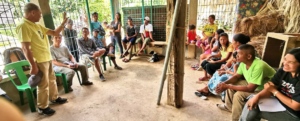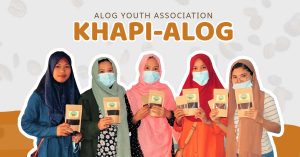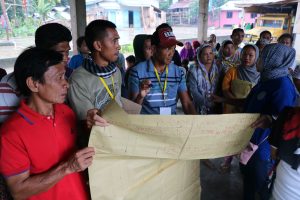Abaca fibers hang inside the learning facility of Man-ai Integrated Agroforestry Cooperative which is being dried up and readied for classification and bundling. Inside a dimly lit space, the names of the members of the cooperative are listed on a manila paper which is posted on the apex part of the wall while in the adjacent space, evidences of on-going storage facility construction awaits completion.
Figure 1.Marilyn Lumpinay, one of the women members of Man-ai Integrated Agroforestry Cooperative, asserted diversification of agricultural products for food security. (VMG).
This group of farmers, situated in sitio Man-ai, Tignapoloan, Cagayan de Oro city, is one of the leading production guilds composed of 59 households with 62 women and 44 men as members.
After years of existence as an association, it slowly transitioned into a cooperative now being led by a woman community leader.
“Women play pivotal roles in the abaca industry where most help in farm preparation and maintenance, nursery development, in vegetable gardening, and in tuxying abaca pulps during harvest seasons. Inside homes, they championed in nurturing their children, providing family’s basic healthcare, relied on their kitchen expertise, as well as in financial management, especially those who are tending small sari-sari stores,” expressed Villafor A. Cabaring, chairperson of the cooperative.
Cabaring, who honed her leadership skill as previous chairperson of Kalipi—a national women organization organized by the Department of Social Welfare and Development (DSWD), transitioned to take the rein of leading the group’s planning, organizing, directing, business management, and motivating members to be participative in all of its decision-makings and undertakings.
Figure 1 Villaflor Cabaring, in yellow polo, discussed a concern pertaining to gender inclusion during the Learning Review in Iligan city on June 10-13, 2022(VMG).
As one of the community partners of EcoWEB, they are among those who benefited in the implementation of the three-year project funded by the Bread for the World of Germany called Formation of Production Guild and Social Enterprises for Economic Development of Indigenous Communities (FPG-SEEDIC) which intends to contribute to the gender-responsive sustainable development of the three Ancestral Domains of Indigenous People in North-Western Mindanao.
In the last three years, farmers in the Indigenous communities covered by the project, explored into gender inclusion in developing resilience and productivity of abaca farmers and in their abaca enterprise. The project is also aimed to contribute in the improvement of the the capacity of the indigenous people’s communities in the sustainable management and development of their ancestral domain.
Through it, the cooperative availed technical assistance, training, and seminars on abaca growing, nurturing, and harvesting.
“As a partner, we were able to secure financial assistance which helped realized the social enterprise on abaca; financial assistance for the on-going construction of abaca storage; and acquire machines and farm tools which hasten the production of fiber compared to the manual process,” said Cabaring, adding “these are responsive to the needs of the farmers.”
The group received ₱ 200,000 worth of start-up capitalization for the social enterprise focused on buying-and-selling of abaca fiber from members and other producers in the community.
For them, the knowledge sourced is compatible with its local culture and indigenous way of dealing with farm lives which boost their capacity and confidence as a cooperative.
“The capacity development availed by the cooperative from EcoWEB is complemented with our efforts to economically empower ourselves, too. We practice gender and social equity here not only in the membership, or in leadership, but also in the actual participation in farm management too — which includes the production of fiber and in contributing our time and skills in voluntarily helping the construction of the abaca fiber storage,” Cabaring explained.
She said that the members’ resilience is not fully dependent on income derived from abaca but the subsistence of members is also supported by the harvest of their agricultural products like root crops, by vegetable gardening, sourcing alternate income, and as vendors.
“Kung magsalig ka sa abaca, naa baya panahon nga walay harbison. Kung walay tanom nga lagutmon, mapasmo ang pamilya (If you rely on abaca, there are periods when there is nothing to harvest. Without root crops, we will starve),” said Marilyn Lumpinay while tucking her farm tools inside its wooden sheaths and who was around with her child to help tend the facility.
“We also planted bananas, fruits, and root crops like bidyak and kamoteng kahoy,” she remarked.
The cooperative has already accessed four decorticating machines from the Department of Trade and Industry (DTI) and are hoping for an additional manual stripping device.
Leaders acknowledged that while members are participative however, it’s also beset with internal challenges on disinformation, slow understanding on the nature of the cooperative, and absenteeism of some members because of personal liabilities to work about.
“Farming is hard work. Women’s physical stamina is challenged to hurdle through the difficult aspects of harvesting the abaca pulps. Sometimes, there are also husbands that are drunkards, which others advice should be addressed by counselling, “expressed Cabaring.
She lamented that there were instances when members assumed that the benefits accrued to the organization as start-upcapital will be distributed to the members as cash assistance despite the explanations. Such caused misunderstanding and distrust affecting relations. There are also members’ loans which remain to be collected.
Externally, other roads connecting Man-ai to the rest of the sitios of Tignapoloan are hoped to be completely constructed to reduce risks in the transportation of goods and to increase access for other necessities.
Figure 3 Charlie U. Tangog, former chairperson of the cooperative, talked about the relevance of leadership values to balance the organizational management. (VMG).
“Hunglos, which is prominently done as collaboration in farm works, is possible only for those who are willing to volunteer their time and services. In our cooperative, this is applied only in the construction of the association’s abaca fiber storage. Hunglos however is ineffective in farm work collaboration here. Most member farmers prefer to spend their time and services in their respective farms,” explained Charlie U. Tangog, former chairperson of the cooperative.
“These days, we have so much abaca to harvest but we still need to increase the number of abaca pulp strippers. There is a need to improve the organizational relations to motivate members to contribute their time and skills as volunteers for the completion of abaca storage construction,” he added.
“We also need to change the old idea that children should be discouraged to pursue farming as a profession and push them for white collar jobs. Unfortunately, some elders are viciously turning the youths’ hearts against agriculture. For me, we cannot wait for others to feed us,” Tangog reflected.
“On matters pertaining to internal management, it is very important for organizations to value patience, perseverance, sustainability, deescalate misunderstanding and conflicts, promote understanding, and uphold accountability on all assistance received, including those from EcoWEB which we luckily availed. We should stop rumor-mongering. It does no good,” Tangog explained.
As an organized cooperative, they were able to gather technical support from DTI for the construction of a farmer’s office. They hope to avail from the Department of the Natural Resources (DENR) some fruit trees for plantation as part of the initiative to improve agroforestry in the hinterland communities and to increase the urban zone’s resiliency from flooding.
The cooperative also availed from DOLE’s goat dispersal for dairy, meat, and organic fertilizers. This will cost about ₱ 50,000 which include an allocation of ₱13,000 materials to house the goats.
They also received P 100,000 interest-free loan assistance from the EcoWEB for the establishment of their community grocery store. It is part of the AVPN KKR-COVID-19 fund. The project is an addition to their community’s effort for recovery from the impact of COVID-19.
They hope for EcoWEB to sustain its support for hinterland communities in the abaca trading. (Violeta M. Gloria)



